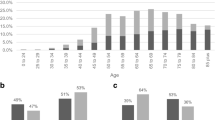Abstract
Background
The incidence of colorectal cancer following a normal colonoscopy in the Medicare population is not known.
Methods
A 5% national sample of Medicare enrollees from 1996 to 2005 was used to identify patients undergoing complete colonoscopy. A colonoscopy not associated with any procedure (e.g., biopsy, polypectomy or fulguration) was defined as a negative colonoscopy. Patients with history of inflammatory bowel disease, colorectal cancer or death within 12 months of colonoscopy were excluded. A multivariable model was constructed to evaluate the factors associated with a new diagnosis of colorectal cancer in the period from 12 to 120 months following the negative colonoscopy.
Results
Among 200,857 patients (mean age 74 years, 61% female, 92% White) with a negative colonoscopy, the incidence of colorectal cancer was 1.8 per 1,000 person-years. The incidence rate for matched follow-up periods decreased from 2.0/1,000 person-years for patients undergoing colonoscopy during 1996–2000 to 1.2/1,000 person years during 2001–2005. Multivariate analysis revealed a significant regional variation in the incidence of colorectal cancer following a negative colonoscopy. The incidence was higher in patients >85 years, males and patients who underwent a negative colonoscopy by a non-gastroenterologist or endoscopist in the lowest volume quartile. On stratified analyses, endoscopist volume was a significant predictor for non-gastroenterologists only.
Conclusions
The specialty and experience of the endoscopist are significant predictors of the incidence rate of colorectal cancer in Medicare patients with a negative colonoscopy.

Similar content being viewed by others
References
Harewood G, Lieberman D. Colonoscopy practice patterns since introduction of medicare coverage for average-risk screening. Clin Gastroenterol Hepatol. 2004;2:72–77.
Phillips K, Liang S, Ladabaum U, et al. Trends in colonoscopy for colorectal cancer screening. Med Care. 2007;45:160–167.
Prajapati D, Saeian K, Binion D, et al. Volume and yield of screening colonoscopy at a tertiary medical center after change in medicare reimbursement. Am J Gastroenterol. 2003;98:194–199.
Gross CP, Andersen MS, Krumholz HM, McAvay GJ, Proctor D, Tinetti ME. Relation between medicare screening reimbursement and stage at diagnosis for older patients with colon cancer. JAMA. 2006;296:2815–2822.
Singh H, Turner D, Xue L, Targownik L, Bernstein C. Risk of developing colorectal cancer following a negative colonoscopy examination: evidence for a 10-year interval between colonoscopies. JAMA. 2006;295:2366–2373.
Schenck A, Klabunde C, Warren J, et al. Data sources for measuring colorectal endoscopy use among medicare enrollees. Cancer Epidemiol Biomarkers Prev. 2007;16:2118–2127.
Chao A, Connell C, Cokkinides V, Jacobs E, Calle E, Thun M. Underuse of screening sigmoidoscopy and colonoscopy in a large cohort of US adults. Am J Public Health. 2004;94:1775–1781.
Penberthy L, McClish D, Manning C, Retchin S, Smith T. The added value of claims for cancer surveillance: results of varying case definitions. Med Care. 2005;43:705–712.
Centers for Medicare and Medicaid Services (US). Medicare program; revisions to payment policies and five-year review of and adjustments to the relative value units under the physician fee schedule for calendar year 2002. Fed Regist. 2001;66:55246–55503.
Kahi C, Imperiale T, Juliar B, Rex D. Effect of screening colonoscopy on colorectal cancer incidence and mortality. Clin Gastroenterol Hepatol. 2009;7:770–775; quiz 711.
Lakoff J, Paszat L, Saskin R, Rabeneck L. Risk of developing proximal versus distal colorectal cancer after a negative colonoscopy: a population-based study. Clin Gastroenterol Hepatol. 2008;6:1117–1121; quiz 1064.
Leung W, Lau J, Suen B, et al. Repeat-screening colonoscopy 5 years after normal baseline-screening colonoscopy in average-risk Chinese: a prospective study. Am J Gastroenterol. 2009;104:2028–2034.
Brenner H, Haug U, Arndt V, Stegmaier C, Altenhofen L, Hoffmeister M. Low risk of colorectal cancer and advanced adenomas more than 10 years after negative colonoscopy. Gastroenterology. 2010;138:870–876.
Imperiale T, Glowinski E, Lin-Cooper C, Larkin G, Rogge J, Ransohoff D. Five-year risk of colorectal neoplasia after negative screening colonoscopy. N Engl J Med. 2008;359:1218–1224.
Brenner H, Chang-Claude J, Seiler C, Stürmer T, Hoffmeister M. Does a negative screening colonoscopy ever need to be repeated? Gut. 2006;55:1145–1150.
Rex D, Cummings O, Helper D, et al. 5-year incidence of adenomas after negative colonoscopy in asymptomatic average-risk persons [see comment]. Gastroenterology. 1996;111:1178–1181.
Lieberman D, Weiss D, Harford W, et al. Five-year colon surveillance after screening colonoscopy. Gastroenterology. 2007;133:1077–1085.
Haseman JH, Lemmel GT, Rahmani EY, Rex DK. Failure of colonoscopy to detect colorectal cancer: evaluation of 47 cases in 20 hospitals. Gastrointest Endosc. 1997;45:451–455.
Bressler B, Paszat LF, Chen Z, Rothwell DM, Vinden C, Rabeneck L. Rates of new or missed colorectal cancers after colonoscopy and their risk factors: a population-based analysis. Gastroenterology. 2007;132:96–102.
Singh H, Nugent Z, Mahmud S, Demers A, Bernstein C. Predictors of colorectal cancer after negative colonoscopy: a population-based study. Am J Gastroenterol. 2010;105:663–673; quiz 674.
Rabeneck L, Paszat L, Saskin R. Endoscopist specialty is associated with incident colorectal cancer after a negative colonoscopy. Clin Gastroenterol Hepatol. 2010;8:275–279.
Pickhardt P, Nugent P, Mysliwiec P, Choi J, Schindler W. Location of adenomas missed by optical colonoscopy. Ann Intern Med. 2004;141:352–359.
Miller R, Lehman G. Polypoid colonic lesions undetected by endoscopy. Radiology. 1978;129:295–297.
Soetikno R, Friedland S, Kaltenbach T, Chayama K, Tanaka S. Nonpolypoid (flat and depressed) colorectal neoplasms. Gastroenterology. 2006;130:566–576; quiz 588–589.
Conflict of interest
Authors have no conflicts of interest.
Author information
Authors and Affiliations
Corresponding author
Rights and permissions
About this article
Cite this article
Singh, A., Kuo, YF., Riall, T.S. et al. Predictors of Colorectal Cancer Following a Negative Colonoscopy in the Medicare Population. Dig Dis Sci 56, 3122–3128 (2011). https://doi.org/10.1007/s10620-011-1788-6
Received:
Accepted:
Published:
Issue Date:
DOI: https://doi.org/10.1007/s10620-011-1788-6




